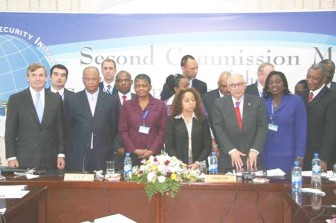As US and Caribbean partners prepare for an upcoming security cooperation dialogue, US Deputy Assistant Secretary for Central America and the Caribbean Julissa Reynoso yesterday reported that the Caribbean Basin Security Initiative (CBSI) has seen results in the support for law enforcement and judicial reform.
Reynoso made this disclosure as the CBSI Commission began a two-day meeting to review progress under the regional security partnership, at the Guyana International Conference Centre at Liliendaal. The Commission, which comprises representatives from the US, CARICOM Member States, the Dominican Republic, CARICOM Implementation Agency for Crime and Security (IMPACS), and the Regional Security System, is meeting to prepare for the second US-Caribbean Security Cooperation Dialogue scheduled for next month in the Bahamas.

“We are proud of the accomplishments of the past year under the CBSI,” she was quoted as saying in a statement issued by the CARICOM Secretariat. “We have encountered many challenges but we believe that the CBSI provides a useful and necessary framework for coordination and collaboration with our partners in the Region,” she added.
Although the US provided more than US$45 million to support CBSI in its first year, and has committed US$77 million to continue support going forward, the CARICOM Secretariat noted concerns that the CBSI partnership had not made the impact that it should have, and it said that Reynoso argued that while there might have been challenges, in the coming year things would be better.
According to the Secretariat, Reynoso, who heads the US delegation attending the meeting, told a closed door session that the partnership spawned measurable results in the priority areas.
The US, 15 CARICOM member states and the Dominican Republic have identified the reduction of illicit trafficking, the advancement of public safety and security and the promotion of social justice as the core objectives to address threats facing the region.
Reynoso, who is co-chairing the meeting with St Kitts and Nevis, explained that the expanded CBSI budget would be used to support greater coordination and control of border and maritime routes, training and capacity building for law enforcement and justice sector, while continuing previous efforts in education and workforce development for vulnerable youth and at risk populations.
She also announced that in the next few months, the US would be delivering to the Eastern Caribbean high-speed interdiction boats and relevant equipment as part of the US Secure Seas Effort. Those boats would complement ones provided to the Bahamas, the Dominican Republic and Jamaica as part of a broader regional maritime security programme. Guyana and Suriname will also receive riverrain patrol boats and related equipment next year.
In the area of law enforcement information sharing, the Secretariat said she reported that surveys of fingerprint processes, equipment, recordkeeping and training were done in six CARICOM member states and that automated fingerprint identification system equipment was now being purchased for those six member states.
In the area of justice reform, it said Reynoso explained that the CBSI had agreed to dedicate a regional legal advisor to develop a task force to address critical crime issues, including homicides and to advise on legal reforms. In addition, the US and IMPACS are working through the Advance Passenger Information System (APIS) to screen passengers into Caribbean ports of entry. Training on integration of information into national databases, regional border interdiction exercises and border enforcement training for fifty CARICOM customs, immigration and police officers are also planned for the coming months, the Secretariat said.
In the area of promoting social justice, Reynoso was reported as saying that the partnership was supporting education and youth workforce development, including youth entrepreneurship. “We are expanding our youth workforce development projects in the six OECS countries and in Suriname,” she added.
In addition, the US is also working with its CBSI partners to promote effective prevention, detection, investigation and prosecution of financial crimes, including money laundering terrorism financing and public corruption. Preliminary assessments have been conducted in Trinidad and Guyana with technical financial crimes assistance and training would begin in November.
Meanwhile, at the opening ceremony of the meeting, Guyana’s Home Affairs Minister Clement Rohee reiterated the government’s commitment to play a “meaningful role” in combating drug trafficking and emphasised the need for the CBSI to begin delivery to the people through the roll-out of programmes to counter illicit narcotics and weapons trafficking. Addressing gangs and violence and programmes to divert youth from joining gangs, he added, are also of critical importance.
In remarks, US Ambassador to Guyana Dr Brent Hardt, noted that the meeting would provide the partnership with the opportunity to review progress to date and lay the ground work for next month’s cooperation dialogue.
“At the end of our gathering tomorrow [today] we hope that all participants will be able to return home with renewed commitment to the CBSI partnership and a renewed belief that we can work together to enhance the safety and security of our citizens through our cooperation, creativity and perseverance,” he said.
The CBSI is the result of US President Barack Obama’s commitment to a security partnership with the region, made at the Fifth Summit of the Americas, in Port-of-Spain, Trinidad and Tobago, in May 2009.





